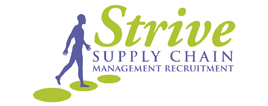Since we first started, the standard 2 interview process is now virtually a thing of the past. Assessment centres, Psychometric testing and personality profiling are now the norm and you may well have already experienced them in varying degrees.
We have always had mixed feelings at Strive about the validity of these based on the fact that some truly great Candidates who have been rejected on the basis of an Assessment centre have since gone on to far greater things with others in the same field. If you haven't been to an assessment centre it can be a daunting prospect and they can come in many formats. In the context of Supply Chain we have seen a standard pattern emerging so hope that the following guide will help assist you in preparations.






Here is a great link to perhaps the most commonly used testing service. https://www.shldirect.com/en/practice-tests
At the site you will find a number of practice questions which should give you a real flavour of what to expect.


Strive UK wide coverageRemote working across the UK. Please contact the team via: T: 0161 477 7555 E: strive@strive.co.uk
